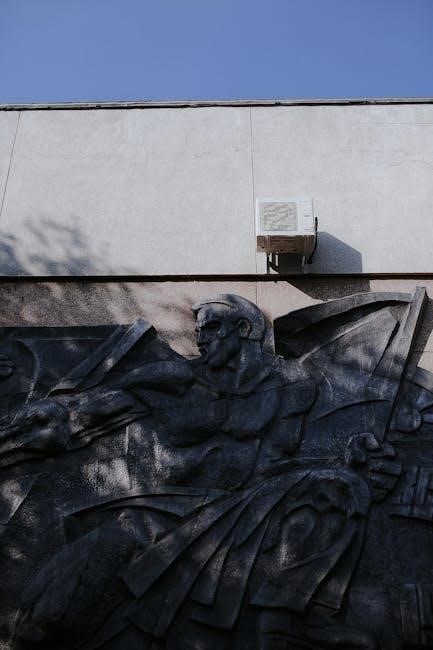The Civil Procedural Code establishes the rules and principles governing civil proceedings‚ ensuring fairness‚ efficiency‚ and constitutional compliance in resolving disputes. It provides a structured framework for legal processes.
1.1. Overview of the Civil Procedural Code
The Civil Procedural Code is a foundational legal document outlining the rules and procedures for resolving civil disputes. It ensures fairness‚ transparency‚ and efficiency in judicial processes. The code covers various aspects‚ including the rights of parties‚ evidence submission‚ and judicial roles. Its structured framework guides legal proceedings‚ from filing complaints to executing judgments. By adhering to constitutional principles‚ the code ensures that all parties receive equitable treatment under the law. It is essential for maintaining order and justice in civil matters.
1.2. Importance of the Civil Procedural Code in Legal Proceedings
The Civil Procedural Code plays a vital role in ensuring fairness‚ efficiency‚ and consistency in legal proceedings. It establishes standardized procedures for resolving disputes‚ preventing arbitrary decisions and ensuring constitutional compliance. By providing clear guidelines‚ the code promotes transparency and accountability in the judicial system. It safeguards fundamental rights‚ such as the right to due process and effective legal protection‚ which are essential for maintaining public trust in the rule of law. The code’s principles and rules are foundational to upholding justice and order in civil matters.

Key Principles of Civil Procedure
The Civil Procedural Code is based on principles of fairness‚ efficiency‚ and protection of fundamental rights‚ ensuring balanced legal proceedings that uphold justice and public trust.
2.1. Constitutional Principles in Civil Procedure
The Civil Procedural Code incorporates constitutional principles such as due process‚ equality before the law‚ and the right to a fair trial. These principles ensure that legal proceedings are conducted with transparency and impartiality‚ safeguarding the rights of all parties involved. By aligning civil procedure with constitutional standards‚ the code promotes justice and accountability‚ ensuring that judicial processes reflect the fundamental values of the legal system. This integration is essential for maintaining public confidence in the judiciary.
2.2. Fundamental Rights in Civil Proceedings
Fundamental rights in civil proceedings include the right to a fair trial‚ equality before the law‚ and the right to present evidence. These rights are enshrined in the Civil Procedural Code to ensure that all parties are treated justly and without discrimination. The code guarantees access to legal representation and the opportunity to defend oneself. By safeguarding these rights‚ the code upholds the integrity of the judicial system and ensures that civil proceedings are conducted in a fair and transparent manner. This protection is crucial for maintaining trust in the legal process.
2.3. Principles of Due Process and Judicial Protection
The principles of due process and judicial protection ensure that all parties in civil proceedings are treated fairly and without bias. These principles guarantee the right to a lawful and transparent trial‚ where the rights of all individuals are safeguarded. Judges play a critical role in upholding these principles by ensuring that procedures are followed correctly and that no party is unjustly disadvantaged. This includes preventing procedural nullities and ensuring access to legal defense‚ thereby maintaining the integrity and fairness of the judicial system.

Structure of the Civil Procedural Code
The Civil Procedural Code is structured to provide a clear and organized framework for civil proceedings‚ detailing procedures‚ rights‚ and obligations to ensure legal certainty.
3.1. Main Sections of the Civil Procedural Code
The Civil Procedural Code is divided into primary sections‚ each addressing distinct aspects of civil proceedings. These include the protection of fundamental rights‚ rental agreements‚ and the registration of real property rights. Additional sections cover procedural rules‚ evidence requirements‚ and the enforcement of judgments. The code also outlines the roles of judicial authorities and the rights of parties involved. This structured approach ensures clarity and consistency in legal processes‚ providing a comprehensive framework for resolving civil disputes efficiently.
3.2. Key Articles and Their Implications
Key articles within the Civil Procedural Code outline fundamental principles and procedures. Article 15 emphasizes the right of parties to self-representation unless legally required otherwise. Article 1 establishes constitutional principles as the foundation of civil proceedings. These articles ensure due process‚ fairness‚ and legal certainty. Their implications extend to safeguarding individual rights‚ promoting judicial efficiency‚ and maintaining public trust in the legal system. Compliance with these provisions is essential for upholding justice and the rule of law in civil matters.
3.3. Historical Development of the Code
The Civil Procedural Code has evolved significantly over time‚ with roots tracing back to foundational legal frameworks. Originally established to standardize civil proceedings‚ it underwent substantial reforms to align with constitutional principles and modern legal demands. Historical milestones include the introduction of the Venezuelan Civil Procedural Code in 1986‚ which modernized judicial processes. The code’s development reflects legal system advancements‚ ensuring fairness‚ efficiency‚ and adaptability to societal changes. Its historical progression underscores the importance of continuous improvement in upholding justice and legal integrity.

Judicial Process in Civil Matters
The judicial process in civil matters involves structured stages‚ from filing claims to delivering judgments‚ ensuring adherence to legal standards and fair dispute resolution mechanisms.
4.1. Stages of the Civil Judicial Process
The civil judicial process typically begins with the filing of a claim‚ followed by preliminary proceedings to outline the case details. Evidence is then presented by both parties‚ and arguments are heard. Judges review the case‚ applying legal principles to reach a verdict. After the judgment is delivered‚ parties may appeal‚ and enforcement procedures ensure compliance with the court’s decision. Each stage is designed to ensure fairness‚ transparency‚ and adherence to legal standards‚ ultimately leading to a resolution of the dispute.
4.2. Role of Judges and Tribunals in Civil Proceedings
Judges and tribunals play a crucial role in civil proceedings by impartially interpreting laws and ensuring due process. They preside over hearings‚ assess evidence‚ and deliver rulings based on legal principles. Their primary duty is to uphold justice‚ protect fundamental rights‚ and maintain procedural integrity. Judges also manage case progression‚ set timelines‚ and enforce compliance with court orders. Their decisions are binding‚ and their independence is essential to the fairness of the civil judicial system. Effective judicial oversight ensures that all parties are treated equitably throughout the process.
4.3. Responsibilities of Judges in Ensuring Due Process
Judges are tasked with safeguarding due process by ensuring all legal procedures are followed fairly and transparently. They must prevent procedural defects‚ guarantee equal treatment of parties‚ and uphold fundamental rights. Judges are responsible for issuing timely rulings‚ managing case progression‚ and ensuring compliance with legal standards. Their impartiality and adherence to the law are critical in maintaining the integrity of civil proceedings. By fulfilling these duties‚ judges protect the rights of all parties involved and uphold the principles of justice.

Rights and Obligations of Parties Involved
Parties in civil proceedings have the right to due process and effective legal protection. They must provide required documentation and adhere to procedural timelines‚ ensuring fairness.
5.1. Rights of Plaintiffs and Defendants
Plaintiffs and defendants in civil proceedings are entitled to equal rights under the Civil Procedural Code. Plaintiffs have the right to initiate legal action and present evidence supporting their claims. Defendants are entitled to be notified of the charges and have adequate time to prepare their defense. Both parties have the right to legal representation‚ attend hearings‚ and challenge decisions through appeals. These rights ensure a fair and balanced legal process‚ aligning with constitutional principles of justice and equality.
5.2. Obligations of Parties in Civil Proceedings
In civil proceedings‚ both plaintiffs and defendants are bound by specific obligations to ensure the process unfolds fairly and efficiently. Plaintiffs must present clear and truthful claims‚ supported by relevant evidence‚ while defendants are required to respond promptly to the allegations. Both parties must comply with court deadlines‚ avoid dilatory tactics‚ and act in good faith. These obligations are fundamental to maintaining the integrity of the legal process and upholding the principles of justice and procedural honesty.
5.3. Representation and Legal Defense
Parties in civil proceedings have the right to represent themselves or be assisted by legal professionals. Legal representation ensures that their rights are protected and their interests are effectively defended. The court may require legal representation in complex cases to maintain procedural fairness. Additionally‚ legal defense ensures that parties can present their arguments and evidence cohesively‚ adhering to the rules of civil procedure. This representation is crucial for navigating the legal system and upholding justice in accordance with the Civil Procedural Code.

Evidence and Documentation in Civil Cases
Evidence and documentation are crucial in civil cases‚ ensuring fairness and transparency. They include various types‚ such as physical and testimonial evidence‚ and must be authenticated properly.
6.1. Types of Evidence Admissible in Civil Proceedings
In civil cases‚ admissible evidence includes physical evidence‚ testimonial evidence‚ and documentary evidence. Physical evidence is tangible and directly related to the case. Testimonial evidence involves witness statements‚ while documentary evidence comprises contracts‚ records‚ and other written materials. Expert evidence‚ requiring specialized knowledge‚ is also admissible. All evidence must be relevant‚ reliable‚ and authenticated to ensure its credibility. The court may exclude evidence if it is deemed inadmissible under procedural rules or if its probative value is outweighed by potential prejudice.
6.2. Requirements for Documentary Evidence
Documentary evidence must meet specific criteria to be admissible in civil proceedings. It must be authentic‚ relevant‚ and properly authenticated. Original documents are preferred‚ though certified copies are acceptable if authenticated by the relevant authority. The document must bear a clear signature or seal‚ and its content must be unaltered. Witnesses may testify to the document’s authenticity if disputed. Compliance with legal formalities‚ such as notarization‚ is essential. The court may reject evidence that fails to meet these standards‚ ensuring the integrity of the proceedings.
6.3. Authentication and Submission of Evidence
Authentication of evidence ensures its validity and reliability in civil proceedings. Documentary evidence must be certified by a notary or competent authority to confirm its authenticity. Witnesses may also testify to the genuineness of documents. The submission process requires adherence to specific deadlines and formats‚ as outlined in the Civil Procedural Code. Failure to comply may result in evidence being deemed inadmissible. The court verifies the authenticity of evidence during proceedings‚ ensuring fairness and integrity in the judicial process. Proper authentication and timely submission are critical to upholding the rights of all parties involved.

Appeals and Recourses in Civil Procedure
Appeals and recourses in civil procedure provide a framework for challenging judgments‚ ensuring fairness and adherence to legal standards. This section outlines the mechanisms for seeking judicial review and upholding the rights of all parties involved in civil disputes.
7.1. Grounds for Appeal in Civil Judgments
The grounds for appeal in civil judgments are primarily based on violations of due process‚ procedural errors‚ or substantive legal violations. These may include defects in the judgment itself‚ such as lack of legal basis or misapplication of the law‚ as well as procedural irregularities during the trial. Additionally‚ appeals can be filed if there is evidence of bias‚ fraud‚ or denial of fundamental rights. The code specifies that appeals must be based on concrete legal arguments‚ ensuring that the appellate process maintains the integrity and fairness of the judicial system.
7.2. Procedure for Filing an Appeal
The procedure for filing an appeal involves submitting a formal petition to the higher court within the prescribed time limits. The appellant must provide a detailed statement of the grounds for appeal‚ supported by relevant legal arguments and references to specific procedural or substantive errors. The petition must be accompanied by authenticated copies of the judgment and other key documents. Legal representation is typically required‚ and the appellant must notify all parties involved. The court may also require a deposit or payment of fees to proceed with the appeal.
7.3. Time Limits for Submitting Appeals
The Civil Procedural Code establishes strict time limits for submitting appeals to ensure judicial efficiency. Typically‚ appeals must be filed within 30 days from the notification of the judgment. This period begins when the parties are formally informed of the ruling. Failure to meet this deadline usually results in the judgment becoming final and unappealable. The appellant must also notify all parties involved within the prescribed timeframe. Extensions may be granted under exceptional circumstances‚ but this requires a separate petition. These time limits are crucial to maintaining the integrity and timeliness of the judicial process.

Execution of Judgments and Enforcement
The Civil Procedural Code outlines procedures for executing judgments‚ ensuring compliance with court decisions. Enforcement authorities play a crucial role in carrying out these processes effectively.
8.1. Procedures for Executing Civil Judgments
Execution of civil judgments involves specific legal steps to enforce court decisions. Authorities may seize property‚ freeze accounts‚ or enforce payment to ensure compliance. The process begins with a written request to the court‚ followed by notification to the debtor. Enforcement measures are carried out under judicial supervision to prevent abuses. Modern codes also incorporate electronic platforms for efficient notification and tracking. These procedures ensure that judgments are fulfilled fairly‚ balancing the rights of creditors and debtors while maintaining legal integrity.
8.2. Role of Enforcement Authorities
Enforcement authorities play a crucial role in executing civil judgments‚ ensuring compliance with court orders. They are responsible for seizing property‚ managing auctions‚ and overseeing the transfer of assets to satisfy debts. These authorities operate under legal frameworks‚ executing writs and injunctions while respecting due process. Their actions are supervised by courts to prevent abuses of power‚ ensuring fairness and transparency in the enforcement process. Effective enforcement maintains the integrity of the judicial system‚ upholding the rule of law and protecting the rights of all parties involved.
8.3. Challenges in Enforcement of Judgments
Enforcing civil judgments often faces challenges such as debtors concealing assets‚ lack of clear legal frameworks‚ and resource limitations. Cross-border enforcement complicates matters due to varying international laws. Additionally‚ delays in court procedures and resistance from debtors can hinder execution. Authorities must navigate complex procedures while ensuring due process‚ making enforcement a costly and time-consuming process. Despite these obstacles‚ advancements in legal cooperation and technology aim to improve efficiency and reduce challenges in enforcing judgments effectively.

International Aspects of Civil Procedure
International aspects of civil procedure involve recognition of foreign judgments‚ cross-border legal cooperation‚ and addressing jurisdictional conflicts to ensure effective enforcement and harmony between nations’ legal systems.
9.1. Recognition of Foreign Judgments
Recognition of foreign judgments is a critical aspect of international civil procedure‚ ensuring decisions rendered in one jurisdiction are honored in another. This process typically requires compliance with bilateral or multilateral treaties‚ as well as domestic laws‚ to verify the judgment’s authenticity and legality. The procedure often involves authentication and legalization of documents‚ such as apostilles‚ to ensure they meet the recipient country’s standards. Courts must also assess whether the foreign judgment aligns with their jurisdiction’s public policy and legal principles. Proper recognition fosters international legal cooperation and upholds the rule of law across borders.
9.2. International Cooperation in Civil Matters
International cooperation in civil matters is essential for effective cross-border dispute resolution. It involves mutual legal assistance‚ service of documents‚ and evidence gathering between nations. Treaties like the Hague Conventions facilitate these processes‚ ensuring efficiency and harmony. States collaborate to enforce foreign judgments and arbitral awards‚ reducing legal conflicts. This cooperation strengthens global justice systems‚ promoting fairness and accessibility for all parties involved in international civil proceedings.
9.3. Conflicts of Jurisdiction in International Cases
Conflicts of jurisdiction arise when multiple legal systems claim authority over the same international case. These disputes often stem from differing national laws‚ territorial claims‚ or interpretations of international treaties. The Civil Procedural Code addresses such conflicts by establishing clear criteria for determining jurisdiction‚ ensuring legal certainty and avoiding parallel proceedings. Initiatives like the Hague Conventions and bilateral agreements further promote harmonization‚ reducing conflicts and fostering cooperation between nations in civil matters. Effective resolution of jurisdictional disputes is crucial for maintaining justice and efficiency in global legal frameworks.

Recent Reforms and Updates to the Code
Recent reforms in Venezuela’s civil procedural code aim to modernize legal practices‚ streamline procedures‚ and enhance judicial efficiency‚ reflecting global trends in legal system updates.
10.1. Key Reforms in Civil Procedural Law
Recent reforms in civil procedural law have focused on modernizing legal frameworks‚ enhancing transparency‚ and streamlining judicial processes. These updates aim to improve efficiency and accessibility‚ ensuring adherence to constitutional principles. Digitalization of procedures and the integration of new technologies have been prioritized to reduce delays and improve case management. Additionally‚ reforms emphasize the protection of fundamental rights‚ ensuring fair representation and equitable outcomes for all parties involved in civil proceedings.
10.2. Impact of Reforms on Judicial Practice
The reforms have significantly influenced judicial practice by enhancing efficiency and transparency. Digitalization of processes and the use of technology have streamlined case management‚ reducing delays. Judges now prioritize fairness and adherence to constitutional principles‚ ensuring equitable outcomes. These changes have also improved accessibility for litigants‚ fostering trust in the judicial system. Overall‚ the reforms have strengthened the administration of justice‚ aligning judicial practices with modern legal standards and societal needs.
10.3. Future Developments in Civil Procedure
Future developments in civil procedure are expected to focus on digitalization‚ enhancing transparency‚ and improving access to justice. The integration of technology‚ such as AI-driven tools for case analysis and virtual hearings‚ will likely become more prevalent. Efforts to streamline processes and reduce delays will continue‚ ensuring efficiency while maintaining fairness. Additionally‚ there may be a stronger emphasis on alternative dispute resolution methods to alleviate court congestion. These advancements aim to modernize the legal system‚ making it more responsive to societal needs while upholding the principles of justice.
The Civil Procedural Code is a cornerstone of justice‚ ensuring fairness and efficiency in legal proceedings. Its principles adapt to future challenges‚ upholding the rule of law and protecting rights.
11.1. Summary of Key Points
The Civil Procedural Code is a comprehensive legal framework governing civil proceedings‚ ensuring fairness and efficiency. It outlines principles like due process‚ stages of judicial processes‚ and rights of parties. The code addresses evidence handling‚ appeals‚ and judgment execution‚ while emphasizing judicial roles and international cooperation. Recent reforms have enhanced its adaptability to modern legal challenges‚ reinforcing its importance in upholding justice and protecting fundamental rights. Understanding this code is essential for navigating civil disputes effectively.
11.2. Importance of Understanding the Civil Procedural Code
Understanding the Civil Procedural Code is crucial for ensuring fairness and efficiency in legal proceedings. It provides clarity on rights‚ obligations‚ and procedures‚ enabling effective dispute resolution. Legal professionals rely on it to navigate complex processes‚ while parties involved gain assurance of due process. The code’s principles protect fundamental rights‚ ensuring access to justice and upholding judicial integrity. Its proper interpretation is vital for avoiding procedural errors and achieving just outcomes. Grasping its provisions fosters confidence in the legal system’s ability to deliver equitable results.
11.3. Final Thoughts on the Evolution of Civil Procedure
The evolution of civil procedure reflects ongoing efforts to adapt legal frameworks to societal needs. Recent reforms aim to enhance efficiency‚ transparency‚ and fairness‚ ensuring access to justice. Digitalization and harmonization of international standards are key focuses. Understanding these developments is essential for navigating modern legal landscapes. The Civil Procedural Code remains a cornerstone of judicial systems‚ continually shaping how disputes are resolved. Its evolution underscores the commitment to upholding the rule of law and safeguarding individual rights in an ever-changing world.
